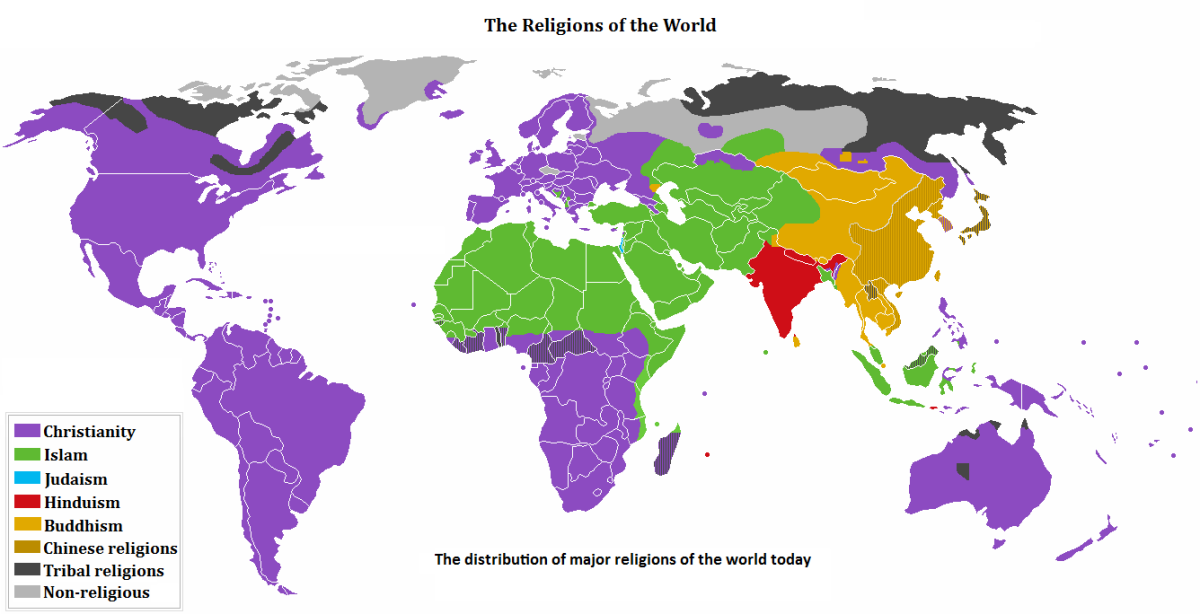Violence and Peace According to Judaism and Islam

An Overview
The concept of peace has proven to be a significant consideration of the religious traditions of humanity throughout the course of history, whether within the context of the inner peace of the individual, or the external peace of the local community and global society. Many religious texts and scholars have been occupied with the meaning of peace and its subsequent implications for humankind.
In conducting any investigation concerning the nature and application of peace on earth, one cannot help but encounter the malicious presence of its inverse: violence and conflict. For what is peace if not, in part, the absence of conflict? It must be made clear that while religious traditions, particularly Judaism and Islam, may seem to condone violence it is only done so under certain circumstances, and rarely advocated as the principal course of action.

Peace and the Abrahamic Traditions
In the case of the Abrahamic traditions, the understanding of peace is closely connected with God and His message; transforming it into an active aspect of the Divine. In these traditions, this aspect of peace is a powerful concept, forming the foundation for many core tenets, in some cases legal obligations. These determine the character of belief in the hearts of their adherents, and the interaction of those adherents with God, themselves and the community at large.
The Judaic and Islamic traditions regard the value of peace to be the ultimate ideal for the entirely of humankind, as established by the divine commandments of God. It brings them closer to the presence of the Divine and manifesting it in the world as nothing else can. It is thus the obligation of the adherents of these traditions to actively strive for the attainment of peace in their personal lives, as well as in the life of their immediate and global community. It is through such that humanity can achieve the full potential of its nature; leading meaningful lives informed by the divine purpose of creation as the vice-regents of God’s divine will on earth.


Peace and Judaism
According to Rabbinic Judaism, peace (shalom) is considered to be the highest human value, to be held above all others. The concept of this peace is an unbelievably complex one, and is not necessarily representative of its normative understanding as merely an absence of violence.
The Hebrew term Shalom designates absolute wholeness of the various human concepts of peace, truth, justice and righteousness, and comprises the whole gamut of Jewish moral principles. The foundation for this perception is found within numerous biblical sources.[1] According to this understanding, some rabbis view ‘peace’ as an active internal process of bringing together all human values into unison that is to be reflected in the external world. This is achieved through being righteous by following God’s law, thus establishing the messianic kingdom on earth.[2] This process, or at least the attempt of it, is considered to be compulsory for all Jews as required by the Mosaic covenant. The Israelites are bound to righteousness as the cost of their divinely-achieved freedom from bondage in Egypt. Interestingly, Rabbinic Judaism also includes the entirety of humankind in this obligation of peace and righteousness through the Noachitic covenant. The terms of this covenant prohibit humanity from harming one another, which is the inevitable result of the imbalance of any of the human values encompassed by the concept of shalom.
God’s covenant is one of life and peace (Mal 2:5).[3] As such, peace is the most important human value. It is the highest in terms of merit and social implications in the Judaic tradition, and is the ideal state of humanity. According to Rabbinic Judaism, the value of peace forms the fundamental prerequisite for all other moral and social principles. As such, it provides the basis for a large section of Talmudic laws categorised as judicial responsibilities ‘for the sake of peaceful ways’[4].
The basis for this perception is to be found within the Judaic understanding of the relationship between peace and the nature of God. The Rabbinic definition of peace stems from reflections concerning the assertion on behalf of the biblical text that peace is synonymous with God lifting His face toward the people (Num 6:26). Rabbinic Judaism identifies peace, and the pursuit thereof, with the entity of God Himself, effectively rendering it as the very nature of divine reality. Using various metaphors, the rabbis recognised peace as the manifestation of the presence of God on earth, His gift toward humanity and His Creation. The quest for it is thus the method of bringing the Divine existence into the world. Among the metaphors used in the rabbinic literature are peace as God’s name (Leviticus Rabbah 9, 9 cf. Judg 6:24), as God’s presence (Tanhuma Naso, 25 cf. Ps 85:11), as serving God’s throne (Avot Rabbi Natan, 37 cf. Hos 2:21-22), as the vehicle of Divine intercession and revelation (Numbers Rabbah 11, 18), and as the Divinely endowed peaceful coexistence of opposing entities (Midrash Agur cf. Exod 3:2).[5]
The implication of this understanding upon the Judaic attitude towards violence is one of great societal and theological import. The overarching message contained in the rabbinic literature is one of violence as ‘Godlessness’. For example, the Zohar claims that one who practices violence is in effect denying the name of God (Numbers Zohar, 176). According to this view, it is impossible for a Jew to claim true belief in God and enjoin in violent ways as they are bound to working only towards increasing peace on earth.[6] In what may seem as quite contradictory, the Torah exhibits laws advocating violence when it is inescapable, such as in cases of self defence when an individual or community comes under direct attack. However, the effect of the rabbinic attitude concerning violence leads to the de facto abrogation of such laws through the implementation of severe regulations.[7]
[1] See 2Kgs 20:19; Jer 14:13; Ps 85:11; Is 32:17 NRSV
[2] Rabbi Steven S. Schwartzschild, “Shalom,” in The Challenge of Shalom, eds. Murray Polner and Naomi Goodman (Philadelphia: New Society, 1994), 21.
[3] Schartzschild, “Shalom”, 20.
[4]Mipnay darchay shalom in Hebrew, see Schwartzchild, “Shalom”, 20.
[5] Rabbi Marc Gopin, “Is There a Jewish God of Peace?” in The Challenge of Shalom, eds. Naomi Goodman and Murray Polner (Philadelphia: New Society, 1994), 34.
[6] Gopin, “Jewish God of Peace”, 33.
[7] Schwartzschild, “Shalom”, 22.


Peace and Islam
Similar to Judaism, Islam holds the concept of peace (salam/salm/silm) as the highest intrinsic value that human beings can attain as commanded by the Divine. Fundamentally, the evidence for this is suggested through the name of the religion itself. The Arabic terms ‘Islam’, ‘salm’, ‘silm’ and ‘salam’ all sharing the same Southern Arabic root, slm, itself meaning ‘peace’.[1]
The actual Islamic definition of peace is relatively hard to pin down, due to the complex nature of the Arabic language; each word for ‘peace’ expressing at least a slightly different concept. For example, salm and silm denote reconciliation, submission and subjection, whereas salam indicates intactness, wholeness, welfare and security.[2] Taking the language of the Qur’an into account however, the Islamic view of peace can be determined as inclusive of the latter term. The ultimate objective of Islam is to transform the world into a place where peace is absolutely triumphant, thus a place where all of humanity is peacefully protected and secure from any deliberate, self-serving attempts on their existence.
The Islamic tradition does not perceive peace as the absence of war, but rather the total absence of oppression, corruption, injustice and tyranny.[3] It thus follows that Islamic peace is synonymous with the human value of justice, only attainable when true justice is in effect. Peace is when every human being is treated as an equal to all others and has the freedom to exercise their individual right to formulate their own ideals, and the liberty to practice their own beliefs in harmony with one another.
In addition to peace featuring as an attribute of human beings, it is also found to be among the divine and, by implication, perfect attributes of God. This is evidenced in the Qur’anic description of God’s myriad names, where Peace (al-salam) is listed as one of the most beautiful.[4] As such, the Qur’an considers peace as the characteristic of true believers in Him and his message.[5] Such is the importance of this aspect of peace that God Himself has chosen salam as the proper greeting for Muslims in order to remind them of it, and their obligation to bring His attribute into the world.[6]According to this understanding, the default position of Muslims should always be one of peaceful relation with all others.
The importance of the value of peace as superior to all others in worldly life is firmly asserted by the Qur’an, and is evidenced numerous times in the Hadith of the Prophet Muhammad. This is most clearly revealed in the Qur’anic verse, “Peace is better” (4:128), which formed the foundation for the Prophet’s message to his followers and the entirety of humanity. The Prophet is indeed well-known for his role as a peacemaker, with many stories found within the Hadith that attest to his encouragement of peaceful ways whenever peace was actually attainable, as commanded by God.[7] Such is the prevalence of the Prophet’s insistence on peace that the Sunni hadith collector Sahih al-Bukhari has devoted an entire book to his teachings concerning the making of peace.[8]
The Islamic tradition permits violence in much the same way as Judaism, but with a few deviations. According to Islam there are five instances under which violence is permissible; against oppression, in defence of religion, against foreign aggressors, for the cause of justice and truth, and in enforcing of the law.[9] However, even under these circumstances there are numerous strict limitations laid down by Sharia law, based on Qur’anic verse. These include the prohibition of excessive force, and the obligation to accept peace if offered by the enemy.[10] It is important to note however, that although aggressive defence is presented as an acceptable temporary mean in the Qur’an (22: 39-40), violence is only to be used as a last resort, when all efforts to achieve a negotiated agreement have failed. Muslims are commanded by God to always hold peace, achieved through patience, as the primary objective, and are to seek it at every possible opportunity.[11] A clear and powerful example of this insistence on peace as the ideal course of action is the Treaty of Hudaybiyyah, where the Prophet accepted the severe conditions of the Meccan pagans in order for him and his followers to perform their pilgrimage in peace. He put his life and that of his followers at great peril by disarming himself and his companions even though the Meccans retained their weaponry, so as to avoid bloodshed.[12]
[1] Helmer Ringgren, Theological Dictionary of the Old Testament (Grand Rapids, MI: William B. Eerdmans, 2006), 17.
[2] Ringgren, Theological Dictionary, 17.
[3] Abdul Jalil Sajid, Islam and Ethics of War and Peace, http://www.inglewhite.net/pfp/sajid_islam_and_ethics_of_war_and_peace.htm (accessed September 22, 2010)
[4] Zeki Saritoprak, “An Islamic Approach to Peace and Nonviolence: A Turkish Perspective,” The Muslim World 95, no. 3 (2005): 413-427, 414..
[5] See Qur’an 56:26
[6] Sajid, Ethics of War and Peace
[7] Sajid, Ethics of War and Peace
[8] See al-Bukhari, Book XLIX (Sulh-Peacemaking)
[9] See Qur’an 2:190;2:193;2:194; 2:244;4:74-75; 4:76;22: 39-41;22:78;28:83.
[10] See Qur’an 2:190;2:193;8:61.
[11] See Qur’an 8:1, 49:9.
[12] Al-Bukhari, Book XLIX (Sulh-Peacemaking), hadith no.862.
References
-
Ariel, David S. What Do Jews Believe? New York: Schocken Books, 1996.
-
Bently, Rabbi Philip J. “How to Deal with Your Enemies: A Survey of Rabbinic Sources”. In The Challenge of Shalom, edited by Naomi Goodman and Murray Polner, 27-31. Philadelphia: New Society, 1994.
-
Chilton, Bruce, and Jacob Neusner. Types of Authority in Formative Christianity and Judaism. London: Routledge, 1999.
-
Christmann, Andreas, ed. The Qur’an, Morality and Critical Reason: The Essential Muhammad Sharur. Leiden: Koninklijke Brill, 2009.
-
Esposito, John L. Islam: The Straight Path. New York: Oxford University Press, 2005.
-
Gopin, Rabbi Marc. “Is There a Jewish God of Peace?” In The Challenge of Shalom, edited by Naomi Goodwin and Murray Polner, 32-39. Philadelphia: New Society, 1994.
-
Harris, Michael J. Divine Command Ethics: Jewish and Christian Perspectives. London: Routledge, 2003.
-
Parshall, Phil. Understanding Muslim Teachings and Traditions: A Guide for Christians. Grand Rapids, MI: Baker Books, 1994.
-
Nasr, Seyyed Hossein. The Garden of Truth. New York: Harper Collins, 2007.
-
Sajid, Abdul Jahl. Islam and Ethics of War and Peace. http://www.inglewhite.net/pfp/sajid_islam_and_ethics_of_war_and_ peace.htm (accessed September 22, 2010).
-
Saritoprak, Zeki. “An Islamic Approach to Peace and Nonviolence: A Turkish Experience”. The Muslim World 95, no. 3 (2005): 413-427.
-
Schiffman, Lawrence H., ed. Texts and Traditions: A Source Reader for the Study of Second Temple and Rabbinic Judaism. Hoboken, NJ: KTAV, 1998.
-
Schwartzschild, Rabbi Steven S. “Shalom”. In The Challenge of Shalom, edited by Naomi Goodman and Murray Polner, 16-25. Philadelphia: New Society, 1994.
-
Tritton, A.S. Islam: Belief and Practices. New York: Routledge, 2008.







